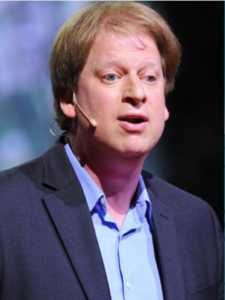By Sarah Frazer || Contributing Writer

This week’s Common Hour was given by Paul Bloom, an award-winning author, renowned scientist, and professor of psychology at Yale University. In his latest book, Against Empathy: The Case for Rational Compassion, and at his Common Hour talk of the same name, he contends that empathy can, in fact, make the world worse.
First, Dr. Bloom claims that he is not against people having emotional intelligence: understanding what others need and want. He simply views this skill as morally neutral since sadists and other immoral people also desire to know the feelings of the people whom they hurt.
Bloom’s issue is with the idea of “putting yourself in another’s shoes.” Bloom cites the neuroscience of empathy – that when empathetic people have their brains scanned in labs, the science shows them to feel literally, in one sense, that hurt in their brains.
The problem illuminated by this test is that empathy can cause people to feel emotionally exhausted. Buddhist literature distinguishes between sentimental compassion, which is draining, and love, which fills someone with happiness and energy. “Compassion gives rise to good health and prosocial motivation. Empathy gives rise to stress and poor health,” concluded Bloom.
Dr. Bloom discussed an argument people make in support of empathy as being good for the world, the empathy-altruism hypothesis. This hypothesis suggests that if you feel empathy for someone, you are more likely to help them.
Even if one assumes this idea to be true, it can sometimes have negative consequences. For instance, there are countless cases where aid we give to people in the developing world does not help them and actually makes their plights worse. The reasons for this problem are manifold. The money or resources could fall in the hands of malevolent people. When people give money to child beggars, it often does not help them since they are run by criminal gangs and do not see the benefits of that money. Moreover, the more people give, the more children will be pushed to beg for money.
Bloom did not sugarcoat it. “You’re making the world worse,” he said to anyone who gives to charity without really researching how it helps and to where it goes. “It depends what you want,” Dr. Bloom continued. “If you want to feel really good about yourself, you should give to a kid in need… savor each [donation you give].”
Then, there are the problematic aspects of empathy, the reality that people have biases when they empathize. Scientifically speaking, “we feel more empathy when someone is the same skin color as us… we are very swayed by in-group out-group” Bloom explained, “We are horrified by attractive girls who are abducted.” He cited the figure that when Natalee Holloway went missing, she received multiple times the amount of news coverage than all of Africa at that time.
“When we let our emotions guide our moral feelings, we ignore the numbers,” Bloom argued. Mass shootings make up 1% of all homicides, yet it feels like more because “numbers don’t mean much to us when we are driven by emotion.” According to Bloom, intellectual acknowledgement involves being unfettered by emotions, and this way of viewing problems is ultimately much more productive. If you consider the absolute amount of suffering from homicide, the amount from school shootings is, frankly, a drop in the bucket.
In addressing the objection he hears about empathy always being a force for good, even an imperfect one, Bloom asserted that empathy “is used as a catalyst for anger.” Specifically, he referenced President’s Trump’s telling people to “look at YouTube videos” of downtrodden Syrians to justify an attack he wanted to conduct in the war-torn nation. Indeed, Bloom noted, “the more empathy you have as a trait, the more punitive you are in your actions,” according to one study.
Another study found no relationship between violence and a lack of empathy. Yet another compared compassion and empathy; it found that concern and compassion produce good behavior while empathy does not. When distinguishing empathy from compassion, scientists have found that the traits activate different parts of the brain. Some argue that without empathy, humans would have no reason to do good. According to Bloom, that is simply not true. “Real human moral motivation has many sources” he elaborated, whether those sources come from love, religion, concern, compassion, or otherwise. “I’m against empathy as a way to determine what the right thing to do is and as a motivator to get us to do the right thing.” It wouldn’t work anyway, according to Dr. Bloom.
“I do want to make a useful suggestion: It’s very tempting to put yourself in other people’s shoes. But I want to suggest it’s a moral trainwreck.”
Junior Sarah Frazer is a contributing writer. Her email is sfrazer@fandm.edu.